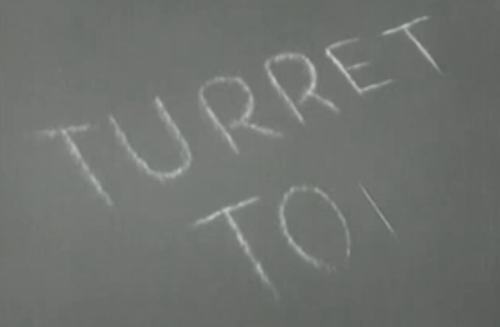'When we have to write long sentences, we use two planes'
BY Alli Warren

At the beer garden I select the bench where the sun will strike my face longest and strongest. I look up to chart the sun’s path and find the sky marked by thick white pocks. I squint and see five flying machines exiting stage left, leaving a trail of letters in their wake. They call this “skywriting,” kids.
Their poetics statement goes: light and fast and quick on the climb, we do it upside down, into the wind, and we make no revisions. Mine goes: I sit below their planes in the beer garden by the estuary on the precipice of the plan to “develop” “5 ½ miles of urban waterfront from Adeline Street to 66th Avenue, including all lands on the water side of I-880 within Port and City jurisdiction.” The gentrification of this area, like all areas of Oakland, is ongoing, and in this liminal space, we sit and drink. First a sour ale then a pilsner then a kristallweizen then a doppelbock, all of which arrive in distinct glass vessels we commend and cheer and get a little sun drunk. I make a toast: let mugs brim always for all and let skywriting be other than advertising. I long for poets! (and mothers! and queers! and revolutionaries! & & & the list is long) to appropriate the machinery and command the skies.
& maybe we will maybe we will, but on this day, the sky decrees:
LIKE US ON FB
When all we wanted was to get a little pleasantly twisted in the sun after clockout, along comes a corporate etching on our constant container, and not only that! but, from our angle, upside down. (I’m no scientist, but does this mean it was right side up for someone somewhere?). Since it demanded deciphering, the inverted script was that much more difficult to ignore, so we squinted faithfully into the dot matrix in the sky as if it contained the key to our liberation. Or at least I did. No one else seemed that amused by the thing.
As a kid, I loved that movie Contact, with Jodie Foster, you know the one. Like Jodie’s character, I too was a girl and I too dreamt about the stars. I had a rickety little blue telescope, which was either too cheap or too embroiled by Los Angeles smog or my own (severe) shortcomings as a child astronomer to catch sight of anything. In the movie, when Jodie Foster’s character makes it to the end of an intergalactic wormhole and floats gravityless in her vessel awestruck at the radiant star system she sees from the passenger window, she finds herself utterly speechless—“they should’ve sent a poet,” she says. As a kid I knew that line was wrong, and know it still now.
Maybe I was drawn to poetry because I am often at odds with language—when I’m confused about grammar, when I misremember figures of speech, when words just don’t seem up to the task, when that choppy internal sea is so obviously not made of linguistic signs. I’m rendered speechless by a lot of things, but especially the moon. All bright and bold and powerful, ever changing. The sun’s not too bad either, all light and warmth and color and shadow production, but you can’t safely gaze into that fiery mouth as long as you can pine longingly at the moon. Maybe I just like to look up? So when on that bright day at the beer garden the blue bowl was defiled by such an inane message, I got a little far flung. I made a few despairing disparaging remarks to my companion about capitalism and technology and blah blah blah, I let my luddite bark strike the boats along the estuary. An estuary, by the way, is a partly enclosed coastal body of brackish water with one or more rivers or streams flowing into it, and with a free connection to the open sea.
As the cold beer warmed in my hand and my companion became bored by my distraction, I daydreamed that someone with more time and better research skills should write something about the horrors of contemporary skywriting, about how skywriting of old was so much better, so much more real. This smarter more ambitious and patient person would write a long book about the history of skywriting, how it’s never been nice, never stopped being not nice, about how nostalgia functions as a sort of balm against action. This smarter wiser historically minded person would always already know, or discover through rigorous and well-documented research, that skywriting has of course always been controlled by capital, was in fact developed for war and then swiftly undertaken for the purposes of corporate advertising. After years of research and painstaking writing, the author would conclude this book with a swelling coda on private property and “nature,” about how preposterous the idea of ownership of airspace is, or the sea, or any natural resource or public good.
What do you think they use to write in the sky? Retired clouds? Aerated bits of dead labor?
Alli Warren was born in Los Angeles. In her poems, Warren explores themes of social, economic, and personal...
Read Full Biography

